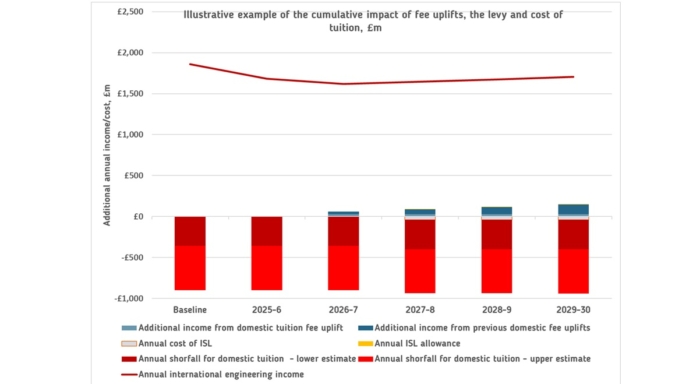It’s been another very busy year for the EPC in what continues to be a challenging and evolving landscape. During the year we’ve had continued uncertainty in government and – for the second year running – three different Secretaries of State for Education. The uncertainty for research funding around ‘will we or won’t we be part of Horizon Europe’ continues. An inquiry has been launched into the Office for Students (OfS) by the House of Lords Industry and Regulators Committee and OfS’ newly appointed CEO is seeking to “refresh” the regulator’s engagement with providers.
Against this challenging and evolving landscape, the role of the EPC in supporting, informing, facilitating networking within and representing the views of the entire HE engineering community is more critical than ever before.
The EPC is a supportive community. This is epitomised when we meet face-to-face for our flagship event – the Engineering Academic Network annual Congress. Our theme this year was ‘New Models’. Around 100 attendees explored with the aid of over 40 speakers and panel members some of the disruptive challenges and innovative approaches in Engineering higher education relating to everything from student pathways into, through and beyond Engineering degrees to how we support our staff to support them to the funding of our research. And what better venue to hold this than at a new “challenger” engineering education-focused HEI. A big “thank you” to all at NMITE for being such wonderful hosts as we took over their campus for three wonderful days.
Since its launch a year ago, EPC Online has developed into a powerful platform supporting the community and development of communities of interest/practice. Do let us know if you feel there is a need for and/or you would like to lead the establishment of a particular community.
EPC Online hosts a number of toolkits. It has been fabulous to see how the engineering ethics toolkit go from strength to strength over the past year – developing into a suite of interactive resources, guidance and teaching materials that enable educators to easily embed ethics into the curriculum, thanks to additional funding from the Royal Academy of Engineering (RAEng). Building on the success of the ethics toolkit, a sustainability toolkit is now under development – funded by the RAEng and Siemens. These are part of the profession’s on-going work to embed both ethical and sustainable practice into the culture of engineering. Do let us know if you would like to get involved with developing any of these toolkits.
In addition to Congress, we ran a number of successful online events over the year, including the following. The authors presented the Tomorrow’s Engineering Research Challenges report – and we discussed the findings. In partnership with The Department for Education and The Institute of Physics, we hosted a webinar focusing on “Why the STEM teacher shortage is our problem (and what we can do about it)” – discussing what can be done to enhance the pre-university stage of the engineering talent pipeline. To aid the CEO of the OfS in her mission to “refresh” the regulator’s engagement with providers, we held a webinar on “The OfS’s priorities for 2023 and beyond” – followed by a constructive Q&A session.
The Quality Assurance Agency for Higher Education (QAA) published the Subject Benchmark Statement for Engineering – with two members of the EPC Board serving on the Advisory Group. The statement, which describes the nature of study and academic standards expected of graduates in engineering, was well received by the engineering community.
The EPC continues to play a key role in responding to a plethora of consultations on behalf of the sector. This has included on REF 2028, apprenticeships, BTECs, foundation degrees, admissions on the most important regulatory changes we have faced since the formation of the OfS and on the regulator itself.
With the emergence of generative AI into mainstream, the sector has been provided with both opportunities and challenges – the latter manifesting itself particularly in the scramble around the sector to ensure that academic integrity was maintained in student assessments. It seems like too good an opportunity to miss to ask ChatGPT to write a summary of my annual report for me – I leave you to draw your own conclusions on the quality/accuracy:
“In the past year, the Engineering Professors’ Council has fostered innovation and collaboration within our academic community, driving advancements in research and education. Through shared expertise and concerted efforts, we’ve propelled our students towards excellence while contributing impactful solutions to global challenges.” [1]
I would like to take this opportunity to thank you all for your engagement with and support of the EPC. The EPC exists to serve the needs of its members. Also, it would not thrive without the dedication of its members. On this note, and with great sadness following his passing, I would like to pay tribute to Professor David Harrison who latterly served the EPC as Honorary Secretary for many years in his characteristic warm and unassuming way — having been a constant presence since the formation of EPC in 1994.
The sheer volume of work being administered by our relatively small EPC Executive Team keeps growing. The quality of work being produced is exceptional. I would like to take this opportunity to thank our team who – under the excellent leadership of our Chief Executive, Johnny Rich – deliver so much on behalf of all of us.
Finally, as my two-year term as President comes to a close, I would like to thank you for the support and understanding you have given me personally. It has been a role I have thoroughly enjoyed and, as I hand over to John Mitchell, I know I am leaving the Presidency in excellent hands. I look forward to continuing working with you all as we continue to build and further strengthen our community
[1] OpenAI (2023). ChatGPT 3.5 (3 August) [Large language model]. https://openai.com/chat




